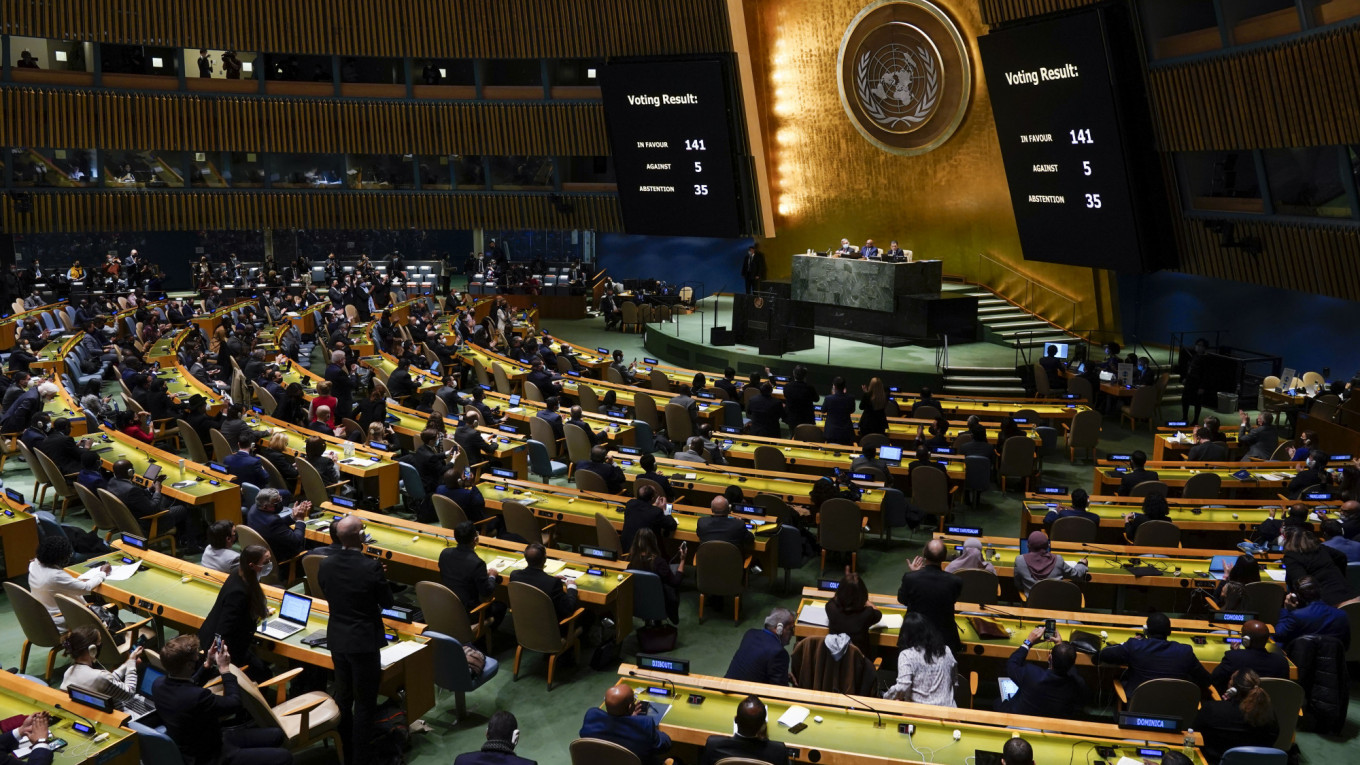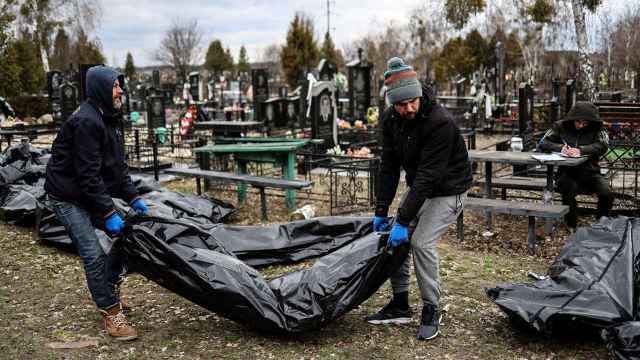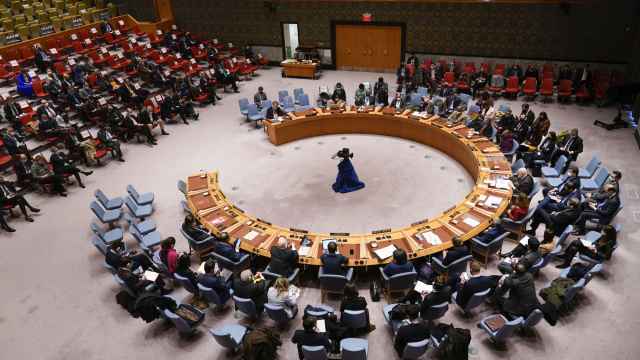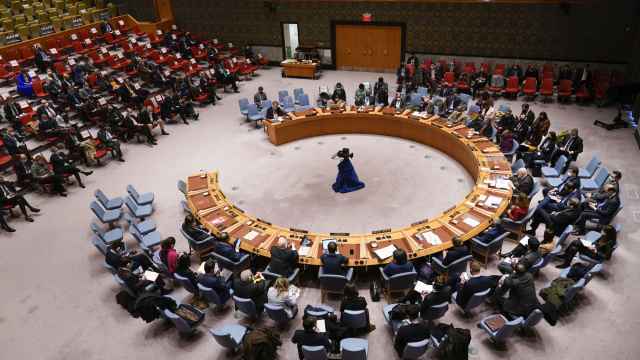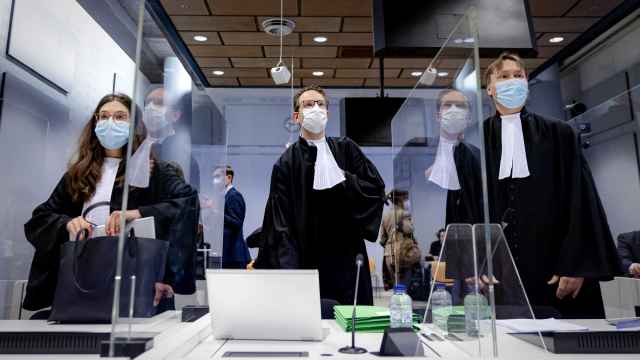The UN General Assembly on Wednesday overwhelmingly adopted a resolution that "demands" Russia "immediately" withdraw from Ukraine, in a powerful rebuke of Moscow's invasion by a vast majority of the world's nations.
After more than two days of extraordinary debate, which saw the Ukrainian ambassador accuse Russia of genocide, 141 out of 193 United Nations member states voted for the non-binding resolution.
"The world is rejecting Russia’s lies," U.S. President Joe Biden said in a statement later Wednesday. "Russia is responsible for the devastating abuses of human rights and the international humanitarian crisis that we are watching unfold in Ukraine in real time."
China was among the 35 countries which abstained, while just five — Eritrea, North Korea, Syria, Belarus and of course Russia — voted against it.
The resolution "deplores" the invasion of Ukraine "in the strongest terms" and condemns President Vladimir Putin's decision to put his nuclear forces on alert.
The vote had been touted by diplomats as a bellwether of democracy in a world where autocracy is on the rise, and came as Putin's forces bear down on Kyiv while terrified Ukrainians flee.
"They have come to deprive Ukraine of the very right to exist," Ukraine's ambassador Sergiy Kyslytsya told the Assembly ahead of the vote.
"It's already clear that the goal of Russia is not an occupation only. It is genocide."
Putin launched the full-scale invasion of Ukraine on February 24. Moscow has pleaded "self-defense" under Article 51 of the UN Charter.
But that has been roundly rejected by Western countries who accuse Moscow of violating Article 2 of the Charter, requiring UN members to refrain from the threat or use of force to resolve a crisis.
The European Union's ambassador to the UN Olof Skoog said the vote was "not just about Ukraine."
"It is about defending an international order based on rules we all have signed up to," he said in a statement.
UN Secretary-General Antonio Guterres said the General Assembly's message was "loud and clear."
"End hostilities in Ukraine — now. Silence the guns — now," he said in a statement.
"As bad as the situation is for the people in Ukraine right now, it threatens to get much, much worse. The ticking clock is a time bomb."
Some delegations chose to place stuffed animals on their tables during the session — a stark visual reminder of the conflict's devastating impact on children.
'Who will be next?'
The text of the resolution — led by European countries in coordination with Ukraine — has undergone numerous changes in recent days.
It no longer "condemns" the invasion as initially expected, but instead "deplores in the strongest terms the Russian Federation's aggression against Ukraine."
Nearly every General Assembly speaker unreservedly condemned the war.
"If the United Nations has any purpose, it is to prevent war," the U.S. ambassador, Linda Thomas-Greenfield, said during her speech on Wednesday.
She accused Russia of "preparing to increase the brutality of its campaign."
"We've seen videos of Russian forces moving exceptionally lethal weaponry into Ukraine, which has no place on the battlefield. That includes cluster munitions and vacuum bombs, which are banned under the Geneva Convention," Thomas-Greenfield said.
Russia's ally Belarus offered a staunch defense of the invasion, however.
Ambassador Valentin Rybakov blasted sanctions imposed by the West on Russia as "the worst example of economic and financial terrorism."
And he followed other Russian allies such as Syria in condemning the "double standards" of Western nations who have invaded countries including Libya, Iraq and Afghanistan in recent decades.
Other speakers cited fears of a domino effect should Ukraine fall to Russia. Colombia railed against any return to "empire," while Albania wondered: "Who will be next?"
From the Arab world it was Kuwait, itself the victim of an invasion by Iraq in 1990, whose denunciation of Moscow was the most explicit.
China, India abstain
Japan and New Zealand led condemnation from Asia, but the continent's giants — China, India and Pakistan — all abstained. During the debate Beijing had stressed the world had "nothing to gain" from a new Cold War.
On the meeting's sidelines, Washington has taken aim at Russians working at the United Nations, leveling accusations of espionage and demanding expulsions.
A Message from The Moscow Times:
Dear readers,
We are facing unprecedented challenges. Russia's Prosecutor General's Office has designated The Moscow Times as an "undesirable" organization, criminalizing our work and putting our staff at risk of prosecution. This follows our earlier unjust labeling as a "foreign agent."
These actions are direct attempts to silence independent journalism in Russia. The authorities claim our work "discredits the decisions of the Russian leadership." We see things differently: we strive to provide accurate, unbiased reporting on Russia.
We, the journalists of The Moscow Times, refuse to be silenced. But to continue our work, we need your help.
Your support, no matter how small, makes a world of difference. If you can, please support us monthly starting from just $2. It's quick to set up, and every contribution makes a significant impact.
By supporting The Moscow Times, you're defending open, independent journalism in the face of repression. Thank you for standing with us.
Remind me later.


